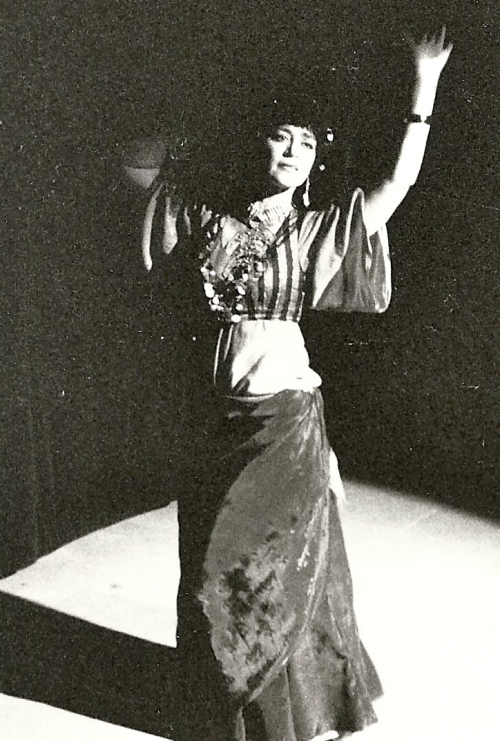THIS IS A LEAFLET /POSTER/ANNOUNCEMENT WHICH I HAVE WRITTEN TO PROMOTE WEEKLY CLASSES IN GLOUCESTERSHIRE UK.

There is a Traditional Egyptian Dance Class in Rodborough on Wednesday evenings 7.45-9.15pm where I teach the old form before this dance was influenced by a Western interpretation. I have a long and full time professional career as dancer both as teacher and theatre performer of this dance and feel myself part of the revival of a tradition which is little known in this country. In the class we learn how to dance without effort, to dance from our inner stability, from our love of the music and our authentic joy of movement. Once we have learned some basic traditional movements there is tremendous sense of freedom to improvise and express ourselves. I love to share this beautiful art form and the sense of well being it brings to our life.
For more information and a Free Taster Class please CONTACT
—————————————————————————————————————————–BALADI WORKSHOP IN BERLIN 24 & 25 FEBRUARY 2018 DANCING THE ARCHETYPES OF WOMAN’S EXPERIENCE
CONTACT SUSANNE TEL: +49 (0)30 420 202 40 EMAI: susanne_donner(at)yahoo.com
http://www.berlin-orientalischer-tanz.de
It is said that when we dance to Baladi (the Blues of Egyptian music) we dance the archetypes of women’s experience. However what does this really mean? It is a subject which continues to fascinate me, and is an exploration I will be returning to again and again in workshops throughout 2018.
In traditional Egyptian dance these archetypes roughly speaking are understood as
1)The Young Woman or girl, perhaps unmarried or without the responsibilities of married life.
2)The Mature Self Possessed Woman, often the boss of an undertaking in Egyptian society.
3)The Wise Woman who has suffered yet survived the travails of life and learned from them.
As dancers we must be careful not to dance these archetypes just as an idea (See ** below). The beauty of Baladi music is that it is nuanced and in order for us to express it we have to respond ‘in the moment’ as that music evokes our changing motions. Much as a poet uses her skill in the art of poetry so the dancer uses the language of her dance form to instinctively express joy, sadness, strength, playfulness and other feelings in all their shades and depths.

Despite this the core of Baladi is its essential simplicity and stability, and is therefore ideal for the less experienced. These characteristics of simplicity and stability give an earthiness and grace and ‘hold’ us as dancers, and we return to them constantly.
For the more experienced, stability and simplicity give a self confidence and foundation. Once they are established we can explore with freedom and curiosity the many rich layers to be found in this very Egyptian urban art.
** I am writing here more about improvised rather than choreographed Baladi. However even when dancing a choreography we need to feel the feelings that arise with the music authentically and not put the emphasis too much on perfecting choreography and technique.
Baladi is a wonderfully rich form of music and traditional Egyptian dance which evolved in the 50s and 60s and earlier. Then as today country people left their villages to find work in the jostling teeming streets of Egypt’s cities. For respite and to further business opportunities they spent time in crowded smokey cafes. Travellers too and musicians from other parts of both the Middle East and from much further beyond would gather to be entertained and to make music, often with a dancer. For music and dancers in cross-cultural exchange this was a platform to experiment and find new freedoms of expression. Whereas much village music and its instruments had remained unchanged over the centuries now non traditional instruments were introduced and integrated into an evolving music often of emotional complexity. It requires of the dancer to reflect that.